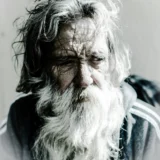
There’s something festering in my house. Inside the walls, between the studs and the exterior, there’s mold, all kinds of mold. My girlfriend and I had to move out temporarily. It’s why this recap is a day late: no TV means I had to wait for “Burn, Witch, Burn!” to hit iTunes. The mold remediation crew says everything should be fine, and us moved back in, in about a week. For the characters on American Horror Story: Coven this week, there’s rot and mold is festering in their homes, too, but the cleansing isn’t nearly so simple.
Throughout this episode, threats and lies, schemes and rot and waste all come from within the structures that the characters believe are solid, safe. It begins in the opening scene, an 1833 Halloween ball held by Madame LaLaurie. Suitors for her daughters attend and LaLaurie rebuffs them, unmanning them at the sight of eyeballs and intestines plucked from slaves. The daughters, fed up with their mother standing between them and marriage, conspire to murder her. Before their plan can mature past discussion, though, LaLaurie discovers it and imprisons them in her attic chamber of horrors, where she punishes their betrayal with a year’s confinement. The act fits the episode’s theme, and sets up drama for later—at the end of episode 4, Marie Laveau had raised zombies, including LaLaurie’s daughters, to attack the coven, so a confrontation is pending—though it’s hard to square with LaLaurie’s insistence that she loved her daughters.
Not surprisingly, another mother-daughter relationship is shot through with internal strife: Fiona and Cordelia (LaLaurie’s daughters plotting to kill her is a nice echo of Cordelia trying to poison Fiona in the first episode). At the end of the last episode, a hooded figure threw acid into Cordelia’s face. Here, she’s badly burned and rushed to the hospital, where doctors are unable to save her eyesight. Despite losing her sight, Cordelia gets a glimpse of how rotten the foundation of her marriage is thanks to what appears to be a new power. When husband Joe, banger and killer of chippies, takes her hand to comfort her, she sees everything he’s done. What seemed to her like a happy, strong marriage is built on sand.
Fiona is unable to do anything for Cordelia (more on that in a moment), so instead she roams the hospital, recriminating herself for causing Cordelia’s blindness, and resurrecting a stillborn baby as a surrogate Cordelia. Though there’s a betrayal regarding Fiona, it’s not as it seems (spoilers ahead). The trio of council witches sent last episode continue their investigation of the school and Fiona’s stewardship of it. When confronted by them, Fiona charges that her old rival, Myrtle Snow (who was involved in Spalding losing his tongue last episode), is a traitor, that she blinded Cordelia and has been undermining Fiona and the coven. When Fiona produces proof—Myrtle’s hand, burned with the same acid as Cordelia’s eyes—the council sentences Myrtle to be burned at the stake. Myrtle, it seems, is a traitor in the coven’s own house. Fiona being who she is, though, this turns out to be false. With Queenie’s help, Fiona has framed Myrtle and used the council to remove an enemy; it’s Fiona who’s the ill influence in her home.
There’s even literal rot in the house: Spalding drenches his attic room with air freshener to cover up the smell of Madison’s corpse, rotting in a trunk.
The internal weakness that struck me the most in “Burn, Witch, Burn!” had nothing to do with characters or relationships. Rather, it had to do with the mechanics of magic. Magic is wielded so inconsistently in Coven that I can’t grasp how it works. As mentioned earlier Fiona (and Misty) regularly uses magic to resurrect the dead—and does so with great ease. It seems hardly any strain for her to pull the dead back across the threshold. There’s no consequence to the use of such power, no weight. And yet, the Supreme is unable to heal her daughter’s burned eyes and restore her sight. How does this make sense? I suspect the next episode or two will contain some explanation, but I’d wager that it’s true more because it aids the plot—it lets Cordelia learn the truth about Joe and gives her a new power that should open interesting story options—than because Coven’s magic is governed by any logical system. That may not bother others, but not being able to reconcile why some miracles are possible while others aren’t keeps me from feeling like this structure is totally sound.









